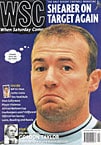 Football admission prices continue to rise unchecked. Matthew Foreman wonders why
Football admission prices continue to rise unchecked. Matthew Foreman wonders why
“Anyone need tickets… Olympic Gallery? That’s £660.91… ” Unfortunately it’s not a tout on the make but the official price for the England v Argentina match. Of course, you could save a bit of cash by buying a Wembley season ticket, only £1,751.25 for ten games. Such extortionate prices for a ground about to be levelled leaves the government with what spin doctors euphemistically call a “credibility gap”.
The evidence of discontent over ticket prices is not hard to find. Only three per cent of those polled in the 1995 survey of Premier League fans by Leicester University thought ticket prices were reasonable. Since then season prices have consistently risen by ten per cent a season and averaged a 12 per cent increase in the Premier League in 1999-2000.
It’s bad enough that those who set the prices can ignore public opinion, but it’s particularly galling when reducing prices has been shown to increase attendances at matches not normally expected to bring in huge crowds. Leeds have sold out Elland Road for FA Cup and UEFA Cup matches when prices have been reduced. Sunderland have even attracted 30,000-plus gates for youth team matches by making them free.
In Italy Silvio Berlusconi once suggested allowing free entrance to all to European matches, the theory being that with TV revenue replacing gate money as clubs’ chief source of income a full house at a match generates the atmosphere TV viewers want. This season in Italy other approaches have been tried. Fiorentina recently cut prices to 1,000 lira (31p) for an Italian cup match and pulled in 10,000. In the Juventus v Napoli second leg in the same round normal prices were charged and only 300 bothered to show up.
But the government already knows cutting prices works. There is the case of the Royal Opera House which was given £76 million of public money on the condition it cut prices to make it less elitist. The same policy is also being applied to museums and art galleries. The Dome, museums and sport all fall under Chris Smith’s powers in the Ministry for Culture, Sport and the Arts. So why is elitism something to be eradicated in the arts but a policy to be encouraged in football?
One clue comes from the home of corporate entertainment and regimented crowds, the US. Over there the sports ticket market has grown up unfettered by the “arbitrary limits” the clubs here fear so much. At the top end of this market stands the Association of Luxury Suite Directors, the ALSD. Luxury seats now account for 16 per cent of all seats sold at major US sports events and they generate more income than the rest of the seats put together. The ALSD has been able to corner the “premium seats market place” with help from its own ticket agency, Skybox, who offer a curious extra called the “best match” facility. This means that if you can’t get the ticket you want Skybox will tell you what the next best thing is.
Bill Dorsey, executive director of the ALSD, sees seats not merely as a money making venture, though: “Premium seats drive facilities construction because of their unique ability to generate revenue streams.” Banks are not keen to finance new grounds on the basis of projected attendance figures but become much more amenable when they see hard cash from pre-sold seats. Dorsey also speaks of his delight at the merger of the world’s biggest architectural practice and stadium specialist, HOK, and Lobb, Britain’s leading stadium designers. As many HOK stadiums are already in the Skybox scheme Dorsey has probably got a whiff of some new revenue streams over here.
It may well be the stink coming from the Wembley fiasco. HOK-Lobb have teamed up with the doyen of modern British architecture, Norman Foster, to design the new Wembley. They were appointed by Ken Bates, head of the English National Stadium Company, a man not known for his concern for the financial plight of the average fan. But even Bates has a master, in this case the government minister responsible, one Chris Smith. Forking out £660.91 for an England match may sound like a lot now but if the ALSD gets involved it may seem cheap. Wembley is currently trying to raise £350 million from the City to help finance the £475 million cost of the ground. Will City institutions be more likely to listen to plans for cheap seats or a Bill Dorsey-style top 16 per cent business plan?
Given the trends of the last few years it’s hard not to see prices continuing to rise as clubs chase the lucrative top end of the market. But some may yet follow the examples of Bournemouth and Charlton and allow more fans into their boardrooms. Maybe Chris Smith will even come up with a harmonised policy for ticket prices in the arts and football. “We do not want to outprice ourselves and lose touch with our traditional heartland and supporter base. We want to promote accessibility,” commented Premier League chief Richard Scudamore after seeing the results of the Leicester University survey.
An odd comment considering the Premier League’s opposition to an audit commission to keep prices low, but perhaps a crumb of comfort. Until we see some real action, though, wait for the next price hike and remember to stand up for cheap seats – we might be able to afford to get in and protest next season.
From WSC 158 April 2000. What was happening this month